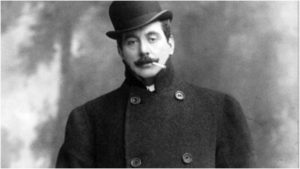
Composer Profile: Giacomo Puccini, One of Opera’s Icons
By David SalazarPuccini is undeniably one of those names that will forever be linked with opera.
Born on Dec. 22, 1858 (his full name was Giacomo Antonio Domenico Michele Secondo Maria Puccini) in Lucca, Italy, he was set to occupy the position of maestro di cappella after his father’s death. However, he was only six-years-old and unable to occupy the position his family had held for 124 years.
He studied music in his formative years and by age 21, he composed his mass and then followed it with his Capriccio Sinfonico.
His first opera, “Le Villi” premiered in 1884 and its modest success enabled him to write his next opera, “Edgar.” It was a major failure and almost cost Puccini his career, as the young composer was also involved in behavior deemed scandalous at the time.
“Manon Lescaut,” his next opera launched his career in earnest, its success a huge boon for him. From there he became the Italian composer of his time, composing until his death in 1923 from throat cancer.
His operas retain a place in the standard repertoire, noted for their intense emotions and strong melodic pull.
Signature Works
Where do you begin? Almost every single one of Puccini’s operas is a repertory staple and among the most performed works in the entire opera world. “La Bohème” is likely his most famous, but “Madama Butterfly,” “Turandot,” and “Tosca” are certainly up there as well.
But even lesser-performed works such as “La Rondine” and “La Fanciulla del West” retain strong places in the standard repertoire.
Puccini is right there with Wagner, Verdi, and Mozart as the major composers of the standard opera repertoire.
Read More on Puccini
Ranking Puccini’s Operas From Least to Best
5 Powerful Moments In Puccini’s Operas
One Essential Recording of Every Puccini Opera
Puccini’s Music in “The Immigrant”
Puccini’s Music in “Bohemian Rhapsody”
Puccini’s Music in “Moonstruck”
Watch and Listen
Here is a slew of Puccini operas to listen to.
Categories
Opera Wiki

